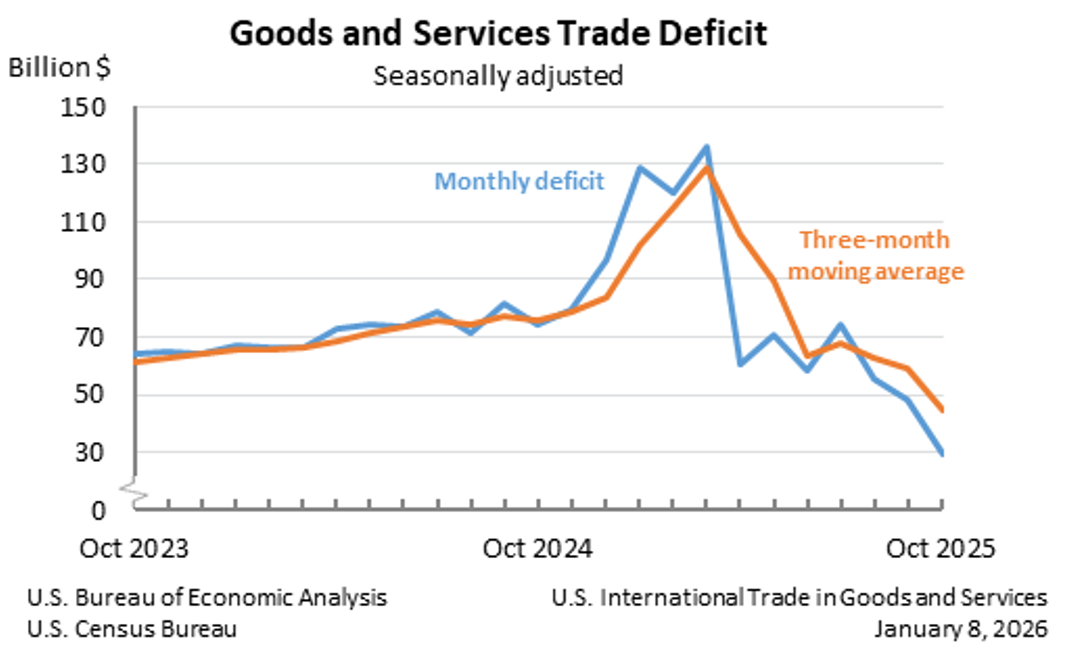Bureau of Economic Analysis
U.S. International Trade in Goods and Services, October 2025
The U.S. goods and services trade deficit decreased in October 2025 according to the U.S. Bureau of Economic Analysis and the U.S. Census Bureau. The deficit decreased from $48.1 billion in September (revised) to $29.4 billion in October, as exports increased and imports decreased. The goods deficit decreased $19.2 billion in October to $59.1 billion. The services surplus decreased $0.4 billion in October to $29.8 billion.
Principal Federal Economic Indicators
Noteworthy
The Latest
The Transformative Power of BEA’s Supply-Use Tables
A blog from BEA Director Vipin Arora
BEA’s supply-use tables may be the unsung hero of economic accounting.
For many, that description immediately brings to mind images of some well-known superhero sidekicks. Yet when I take a step back and think about the impact of supply-use tables, I am reminded of something else entirely: shipping containers.
New Foreign Direct Investment in the United States, 2023
Expenditures by foreign direct investors to acquire, establish, or expand U.S. businesses totaled $148.8 billion in 2023, down $57.4 billion, or 28 percent, from $206.2 billion in 2022.
New Foreign Direct Investment in the United States, 2023
Expenditures by foreign direct investors to acquire, establish, or expand U.S. businesses totaled $148.8 billion in 2023 (chart 1), according to preliminary statistics released today by the U.S. Bureau of Economic Analysis. Expenditures decreased $57.4 billion, or 28 percent, from $206.2 billion (revised) in 2022 and were below the annual average of $265.6 billion for 2014–2022. As in previous years, acquisitions of existing U.S. businesses…
May 2024 Trade Gap is $75.1 Billion
The U.S. goods and services trade deficit increased from $74.5 billion in April (revised) to $75.1 billion in May, as exports decreased more than imports. The goods deficit increased $0.9 billion to $100.2 billion, and the services surplus increased $0.3 billion to $25.1 billion.
U.S. International Trade in Goods and Services, May 2024
The U.S. goods and services trade deficit increased in May 2024 according to the U.S. Bureau of Economic Analysis and the U.S. Census Bureau. The deficit increased from $74.5 billion in April (revised) to $75.1 billion in May, as exports decreased more than imports. The goods deficit increased $0.9 billion in May to $100.2 billion. The services surplus increased $0.3 billion in May to $25.1 billion.
Corporate Profits: BEA’s Suite of Measures Are Essential Indicators
A blog from BEA Director Vipin Arora
Every year, usually in January, I feel absolutely committed to getting a better handle on my finances. All I want to understand—not just at the end of the year, but throughout the year—is exactly what is coming in, what is going out, and what I have left over. Yet I can never seem to calculate these “personal profits,” nor how far I am from the mythical financial goals I’m supposed to have. Maybe my…
Gross Domestic Product by State and Personal Income by State, 1st Quarter 2024
Real gross domestic product increased in 39 states and the District of Columbia in the first quarter of 2024, with the percent change ranging from 5.0 percent at an annual rate in Idaho to –4.2 percent in South Dakota.
Gross Domestic Product by State and Personal Income by State, 1st Quarter 2024
Real gross domestic product (GDP) increased in 39 states and the District of Columbia in the first quarter of 2024, with the percent change ranging from 5.0 percent at an annual rate in Idaho to –4.2 percent in South Dakota.
Personal Income and Outlays, May 2024
Personal income increased $114.1 billion (0.5 percent at a monthly rate) in May. Disposable personal income (DPI)—personal income less personal current taxes—increased $94.0 billion (0.5 percent). Personal outlays—the sum of personal consumption expenditures (PCE), personal interest payments, and personal current transfer payments—increased $56.4 billion (0.3 percent) and consumer spending increased $47.8 billion (0.2 percent). Personal…
Personal Income and Outlays, May 2024
Personal income increased $114.1 billion (0.5 percent at a monthly rate) in May. Disposable personal income (DPI)—personal income less personal current taxes—increased $94.0 billion (0.5 percent). Personal outlays—the sum of personal consumption expenditures (PCE), personal interest payments, and personal current transfer payments—increased $56.4 billion (0.3 percent) and consumer spending increased $47.8 billion (0.2 percent). Personal saving…




